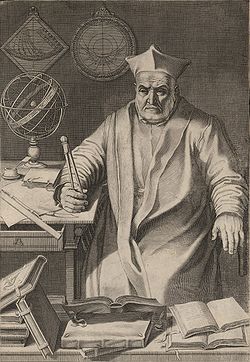- Christopher Clavius
-
For the lunar crater, see Clavius (crater).
Christopher Clavius (March 25, 1538 – February 12, 1612) was a German Jesuit mathematician and astronomer who was the main architect of the modern Gregorian calendar. In his last years he was probably the most respected astronomer in Europe and his textbooks were used for astronomical education for over fifty years in Europe and even in more remote lands (on account of being used by missionaries).
Contents
Early life
Very little is known about Clavius' early life other than the fact that he was born in Bamberg in either 1538 or 1537 (the exact year is somewhat unknown and depends on when one assumes a new year begins). His given name is not known to any great degree of certainty — it is thought by scholars to be perhaps Christoph Clau or Klau. There are also some who think that his taken name, "Clavius", may be a pun on his original German name, suggesting that his name may have been "Schlüssel" (German for "key", which is "clavis" in Latin).
Clavius joined the Jesuit order in 1555. He attended the University of Coimbra in Portugal, where it is possible that he had some kind of contact with the famous mathematician Pedro Nunes (Petrus Nonius). Following this he went to Italy and studied theology at the Jesuit Collegio Romano in Rome. In 1579 he was assigned to compute the basis for a reformed calendar that would stop the slow process in which the Church's holidays were drifting relative to the seasons of the year. Using the Prussian Tables of Erasmus Reinhold, he proposed a calendar reform that was adopted in 1582 in Catholic countries by order of Pope Gregory XIII and is now the Gregorian calendar used worldwide.
Within the Jesuit order, Clavius was almost single-handedly responsible for the adoption of a rigorous mathematics curriculum in an age where mathematics was often ridiculed by philosophers[citation needed]. In logic, Clavius' Law, (inferring of the truth of a proposition from the inconsistency of its negation) is named after him.
He used the decimal point in the in the goniometric tables of his astrolabium in 1593 and he was one of the first who used it in this way. Apparently Francesco Pellos used the decimal point in his Compendio del Abaco already around 1492 but was much less known than Clavius. [1][2][3]
Astronomy
As an astronomer Clavius held strictly to the geocentric model of the solar system, in which all the heavens rotate about the Earth. Though he opposed the heliocentric model of Copernicus, he recognized problems with the orthodox model. He was treated with great respect by Galileo, who visited him in 1611 and discussed the new observations being made with the telescope; Clavius had by that time accepted the new discoveries as genuine, though he retained doubts about the reality of the mountains on the Moon. Later, a large crater on the Moon was named in his honour.
References
See also
- Clavius (crater), a lunar crater named after Clavius
- Clavius Base, a Moon base located in the crater, according to Stanley Kubrick's 2001: A Space Odyssey
- Aloysius Lilius
- Computus
- List of Jesuit scientists
- List of Roman Catholic scientist-clerics
- Bracket (mathematics)
References
- James M. Lattis, Between Copernicus and Galileo: Christoph Clavius and the collapse of Ptolemaic cosmology (University of Chicago Press, 1994).
- Karl Christian Bruhns (1876) (in German). "Clavius, Christoph". In Allgemeine Deutsche Biographie (ADB). 4. Leipzig: Duncker & Humblot. pp. 298–299.
- Edmondo Lamalle: Clavius, Christoph. In: Neue Deutsche Biographie (NDB). Band 3. Duncker & Humblot, Berlin 1957, p. 279. (German)
- Christoph Clavius, Corrispondenza Edizione critica a cura di Ugo Baldini e Pier Daniele Napolitani, 7voll., Edizioni del Dipartimento di Matematica dell'Università di Pisa, Pisa, 1992
External links
- Catholic Encyclopedia article for Christoper Clavius.
- The Galileo Project — biography of Christopher Clavius.
- Opera Mathematica — the complete mathematical works of Christopher Clavius.
- O'Connor, John J.; Robertson, Edmund F., "Christopher Clavius", MacTutor History of Mathematics archive, University of St Andrews, http://www-history.mcs.st-andrews.ac.uk/Biographies/Clavius.html.
- Materialsammlung zur Geschichte von Ingolstadt: Rita Haub: Christoph Clavius
- Clavius Project Historical Archives of the Pontifical Gregorian University.
Categories:- 1530s births
- 1612 deaths
- People from Bamberg
- German mathematicians
- German astronomers
- German Jesuits
- Scientific instrument makers
- University of Coimbra alumni
- Roman Catholic cleric–scientists
Wikimedia Foundation. 2010.


